After nearly a decade in the making, Lost Shore Surf Resort has opened its doors. The surf park in Edinburgh, UK, brings new waves to Scotland with the help of a Wavegarden Cove pool.
Besides being a great way to introduce more people to surfing and attract tourists to the country, the park is predicted to have a major economic impact. Along with creating 130 jobs, the park will contribute £11m to the local economy each year. Lost Shore is anchored by other nearby sports facilities and features resort-style amenities to allow guests to stay on-site.
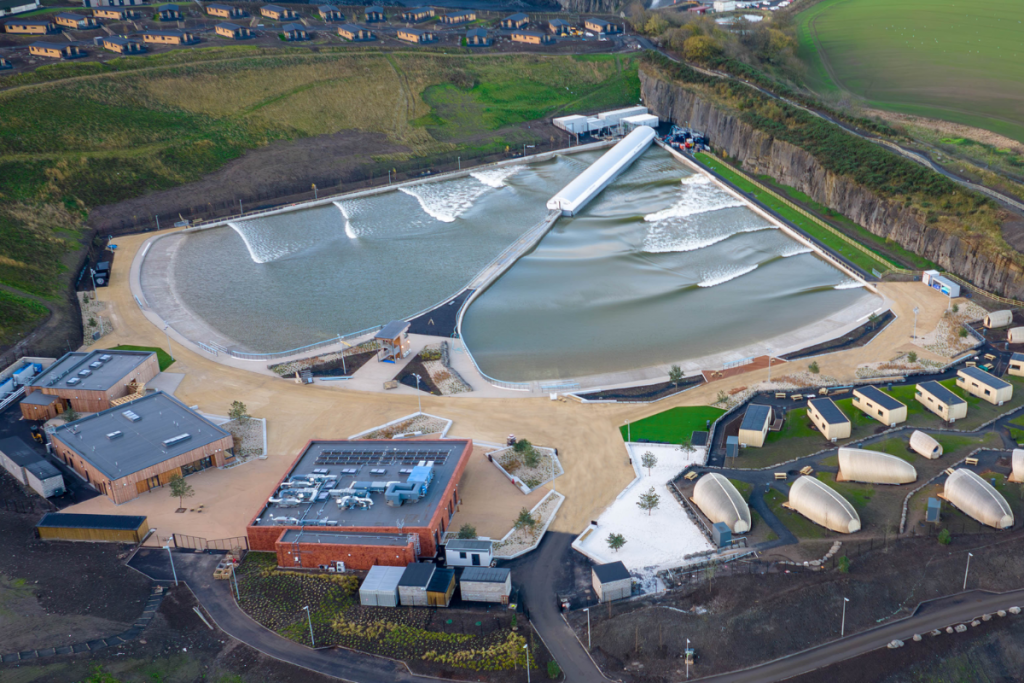
Surf Park Central spoke to Lost Shore founder Andy Hadden about the process of developing a surf park and the road to finding funding. The large project opened in November with hundreds of guests, and according to Hadden, the Scotland winter won’t slow them down.
Surf Park Central: Lost Shore has officially been open for one week. What was the first week like for yourself and the park’s guests?
Andy Hadden: Everyone that’s visited has absolutely loved it from the surf, to the food to the accommodation. Being a surfer myself, I’m particularly pleased with how great all the most crucial surfing elements have performed, from day 1 to improver and right up to the pros loving our big turn, barrel and air settings.
I know our local demographics are going to get hooked on this. Now I want to open this up to the rest of the world. Come to Scotland we can keep you warm in the worlds warmest fleet of rental wetsuits (scientifically tested!) and we’re going to give you the time of your lives, plus more good waves in a week than you could expect in a year.
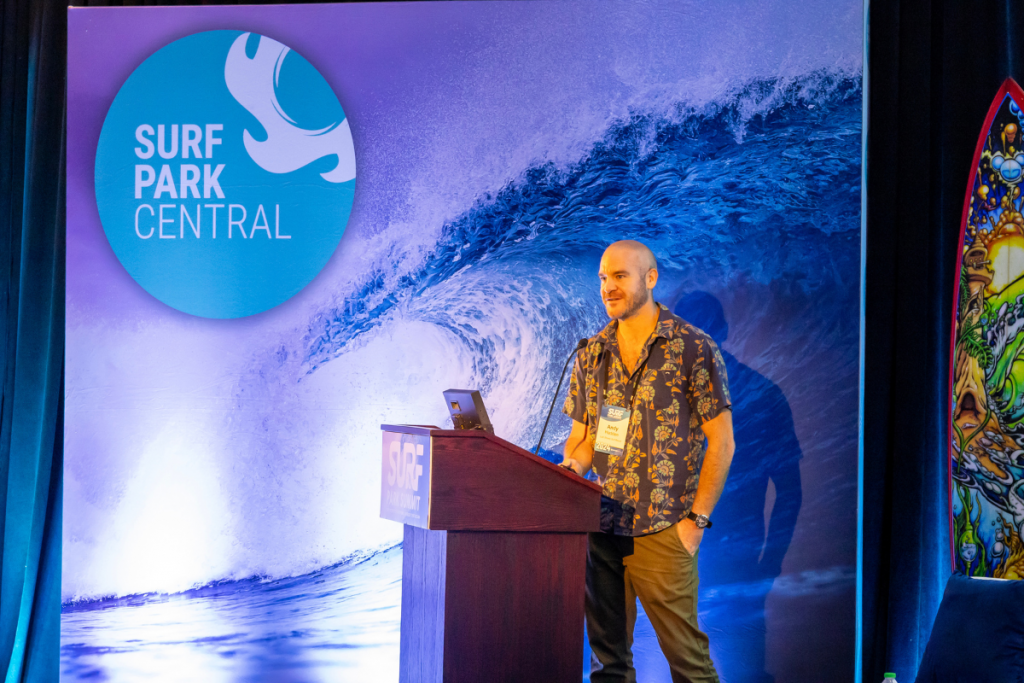
Surf Park Central: This project was a decade in the making. Looking back ten years ago, what inspired you to step into the surf-anchored real estate space?
Hadden: I do look back to 10 years ago about what I thought to myself when I saw the (Wavegarden) test facility in the Basque Country. How could I not only build a wave park but actually how could I make it an institutional grade wave park?
I thought if in 20 years time there’s going to be 200 or 300 of these around the world, then that’s not going to just be rich people throwing money at it. There’s got to be a coherent business plan for that type of quantum. So I thought, how do I not just create a place that could spread joy amongst our local community, providing vital sport, leisure and tourism infrastructure, but how could we make it an institutional-grade investment, allowing us to source cheap capital and therefore remain in strategic control despite starting with neither money or land. We’ve achieved that goal and we couldn’t be happier with the results, the press, and the feedback from guests, both surfers and non-surfers.
Surf Park Central: What were the biggest challenges from developing to financing that you faced along the way?
Hadden: People taking you seriously was the real challenge. We knew what we were doing, but convincing others of that took a lot of time and energy. Understanding the metrics of what really constitutes a viable institutional grade investment proposition is something I don’t think others have quite got their head around, and it didn’t come easily for us either. But when you think about something daily for over a decade you figure out ways to align the interests of the dozens of parties involved, from pension funds to debt and equity and from suppliers to staff.
I think being able to coherently explain all of this to people who were coming in fresh was the hardest part because on paper with appetite, some land and a bit of resources, I think everyone believes they can do it. This global confusion has slowed the market down and remains the most underestimated component of any aspiring developer. To do it truly right is not rocket science, but it takes time and energy in areas that lie outside the conventional thinking of most funders, developers and operators.
Other more obvious challenges have been created market uncertainty. Things like Scottish independence referendums, Brexits, COVID, interest rate rises and increases in construction prices. So all of these elements just need to be taken on their merits and worked through without fuss. To keep our motivation through hard times we’ve kept strong ties into not only the surf community here, and the surf schools and bringing everyone on the journey, but the local politicians, and all of the people who work for us. When you then face those challenges, it’s these people who inspire and help you get through them. Having come from the investment and insolvency real estate world it’s clear to me that these are often the components that are ignored, but they shouldn’t be underestimated as ultimately they are value.
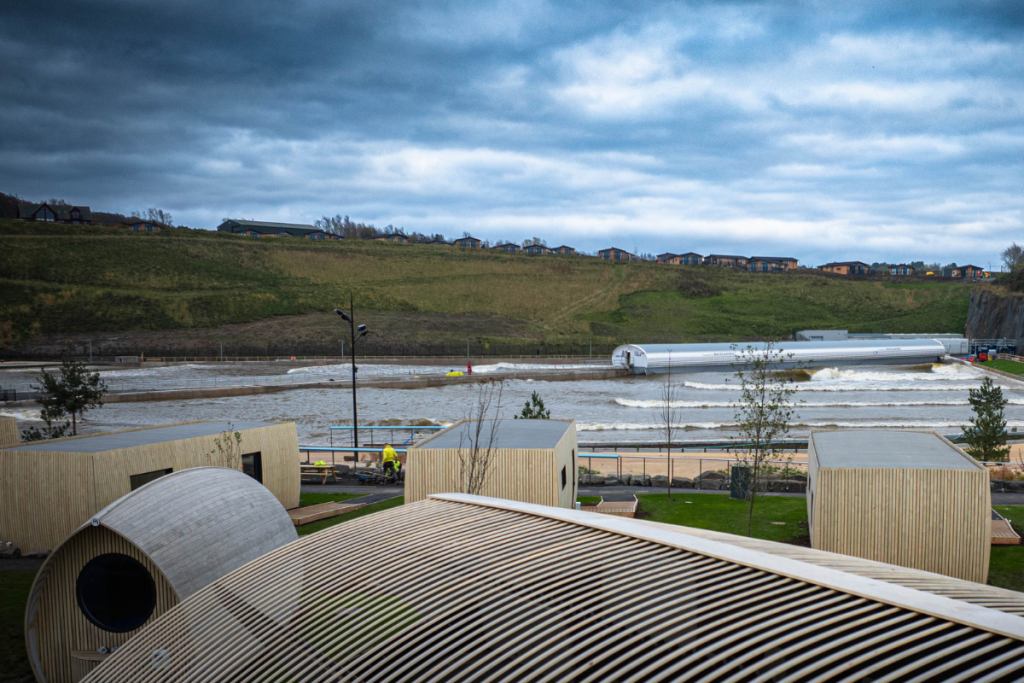
Surf Park Central: As you mentioned, with more parks in existence, it has gotten easier to explain to investors and other stakeholders what you’re trying to achieve. What advice would you give to other developers who are seeking financing?
Hadden: Before you even think about raising the money, you have to be diligent about your business feasibility and your choice of land. You also have to be very confident that you’re going to have a successful ride through the planning permit processes, which often take a while, so city councilors and local stakeholders should be brought along with you. No planning permission, no supportive city, no wave park.
So in the initial years, I think the best way to do it is to focus on those metrics and then really make an above-and-beyond effort to think about what you and all the funding parties want from the development and try to imagine who might actually not be a good fit in the long-run regardless of short term promises. The last thing you want is just to build a surf park and realize you’ve conceded so much ground on the journey it’s no longer yours to enjoy.
Surf Park Central: Do you think with more examples of surf parks and proven wave technologies it’s easier to complete one of these projects now?
Hadden: It’s light years easier than 10 years ago and it’s significantly easier than three or four years ago. Whilst data is trickling in, the reality is until there are one or two more years trading across multiple sites, surf parks won’t be a “no brainer” for any equity at scale.
We’ve shown that in Scotland it’s possible to bring in cheap long-term funds, but we had to fight pretty hard. Until there’s big data readily available I suspect that will be the same for all developers. I’m personally more than convinced of the sector because the data is already compelling, but funding metrics and mandates aren’t based on subjective niceties unfortunately, so unless you can pull some major funding partners along on the journey like we did, and are very honest with them about potential pitfalls, developers will continue to be met with “curious skepticism” by most finance houses.
But life will get easier, so don’t give up.
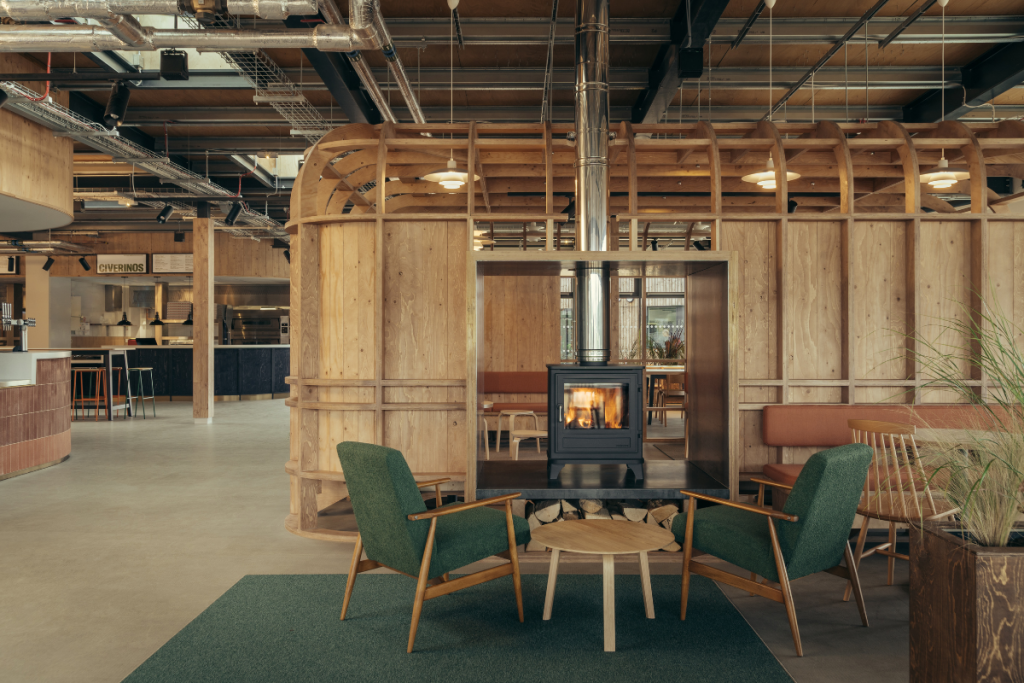
Surf Park Central: You’ve already discussed what it was like seeing a wide range of surfers being able to enjoy your park, but beyond surfing what are the essential amenities that surf park developers need to keep in mind?
Hadden: This is going to be on a case-by-case basis for every developer.
On the drier side, I would say from a property development perspective, these are definitely property developments, certainly to begin with. If you understand the dry metrics of slow but valuable asset-based property funding, you have a head start. But you will only fly if you can piece together a coherent operational plan that gets equity funders excited based on standard return profiles in excess of 20% IRR. For each site, you have to look at the micro-economy in your area and assess what other things you can add besides the surf park to increase your potential for financing.
For us that was accommodation, F&B (food and beverage,) and retail. We know here in Scotland that there’s no lack of people who love to holiday near Edinburgh, and also people love as families to go out at the weekends and just have the best food, hang out and listen to good music. But really every demographic is going to be different, and there’s not a one-fits-all template. The emphasis on what surrounds the wave park should be what is understood to be missing from the local scene. It sounds obvious but it never ceases to amaze me how cookie-cutter leisure-based roll-outs become, and whilst there are lots of fundamentals in creation that can be carried across multiple countries and demographics (how to fund, how to build, etc.), the operational plan should be tailored specifically to each demographic. Choose the lowest hanging fruit that will generate the highest return and work in synergy with the rest of the offers, and run with it.
Surf Park Central: What was the process you went through to determine the demographics for your market?
Hadden: There are multiple ways to do this. Short answer – on the weight of averages I’d say hotels and accommodation are the best generic fit, but even that won’t be right for some models and locations.
As a longer answer, we created an ecosystem of people who gave us constant feedback and constant ideas as to what will and won’t work in our local markets, so that’s how we made our decisions along the journey. My advice for other developers would be to understand the tool belt that these parks give. There’s nothing on earth that gives you more avenues to pull upon than the draw of endless surfing. What I mean by that is you can talk about how it’s high margin technology to one person who only wants to talk money, but equally, you can talk to cities or communities about how fantastic the developments are because of the health and well-being, and the positive impact on local economies. You can talk about how they’re verging on philanthropic due to what you can do with some of your inclusivity provisions, but you can also make them super cool because restaurants and retail want to be next to them. There are just so many ways that you can pull from a wave park masterplan to allow you as a developer to pick and choose how you holistically create a financially viable narrative that aligns interests.
The power and value of surfing is just unbelievable, but only by pulling your surfing communities alongside you can you be sure that the authenticity of your reputation as a credible surfing destination will be preserved.
This sounds exhausting but it really isn’t, and I think developers globally shouldn’t be scared to face the backlash of their local surfers because once you face them down you’ll understand that most of the resistance comes from a genuine place of uncertainty around what impact surf parks could have on our sport. By allowing them to play a role in shaping the facility you can find incredible value in terms of reputational protection, but without consulting those communities it shouldn’t be assumed that surfers will back you as a developer.
And if the surfing community does not genuinely support what you’re doing, then whilst you might get away with it because these resorts are so bloody fun, I don’t believe it’s a risk worth taking when such large sums of money are involved. Remember the general public wants to experience what it’s like to be a surfer for the day, and if they hear that the surf community is against you, it could put them off advocating your facility themselves.
Surf Park Central: These parks are bringing in very experienced surfers, but from day one, did you see less experienced surfers and families heading to Lost Shore?
Hadden: You have to be able to attract almost everyone and give them a good time at your park, from first-time beginners to seasoned pros. It’s great to see that happening at our place, because again whilst you might get away with not hitting these demographics, the long-term viability of the development is significantly derisked if this full top-to-bottom demographic of surfers is catered for. In skiing parlance, you need a great selection of green runs right through to black runs. That’s what creates a ski resort, and that’s why we call ourselves a surf resort.
Surf Park Central: You discussed how more surf-anchored destinations are helping the industry, but do you think we’ll see the industry become more competitive as a result?
Hadden: While I don’t want to discount other technologies because you never know exactly what is around the corner. But at this point in time, I can hand on heart say that the Wavegarden Cove is the only technology, by quite some way, that would pass the institutional grade metrics of mechanical viability, water filtration, track record, etc., beyond just the surfing experience. So it obviously gives them a significant head start.
That said, there is room for a few 100 of these around the world, and I see no reason as to why all the technologies can’t keep advancing and keep, you know, making things happen. I am definitely of the school of thought, having been through it and being one of the only people in the world to have sat across the room from institutional-grade lawyers who don’t get the surfing thing, that they’re interested in aspects that are barely discussed within the inland surf industry.
I noticed that at the Surf Park Summit. It was the best week I’ve had in a long time, and the sessions were invaluable, but the lack of discussion around the true metrics which dictate funding parameters within the industry took me by surprise.
Surf Park Central: Now that you’ve moved from developer to surf park operator, is there anything you would have done differently looking back?
Hadden: No, I don’t think so. Despite the fact that we’ve faced countless challenges, as you know in life, what doesn’t kill you makes you stronger. We’ve found that if you can absorb the good and the bad news that you take on a daily basis and stay focused on the endgame, then all the challenges that we faced have actually just turned us into what we are now.
If I had one piece of advice, I would say to make sure the quantity of decision makers you have within your business is as low as possible. So try to keep both board structures and decision-making as lean and small as possible. When you’re in a startup environment you have to pivot almost hour by hour not just month by month and that’s way more conducive to having just a small number of heads at the helm making quick and assertive decisions, and a great set of enthusiastic rowers behind you.
Surf Park Central: Finally, now that Lost Shore Surf Resort is open, what’s next?
Hadden: We just hosted an amazing event called Gathering of the Clans, and were fortunate to have the WSL in attendance. I believe they left happy and that makes us excited about what the future might bring in the events space. We also have a memorable dining experience called the Lost Feast about to start,and are showing Christmas films during December at the Lost Cinema. After all, we’re a resort, and we really want to show the general public and people flying in with families who don’t surf, that we can have an enjoyable experience for them as well.
Longer term, honestly, I want us to become the number one adventure sport destination on the planet. This might be an unachievable goal, but then so was starting a wave park in a quarry on the edge of Edinburgh ten years ago.





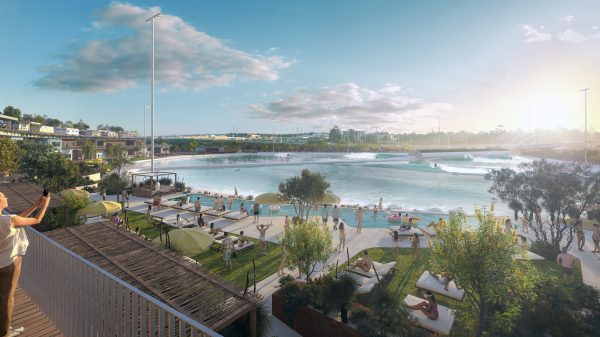
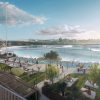


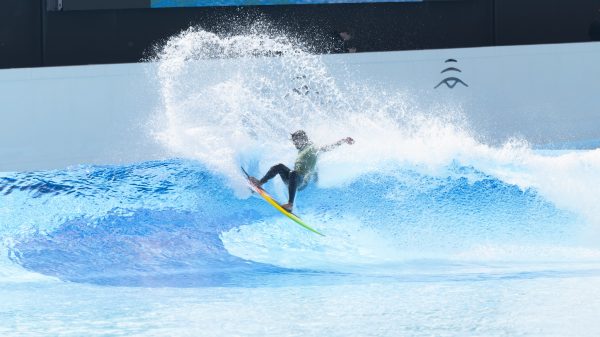
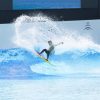
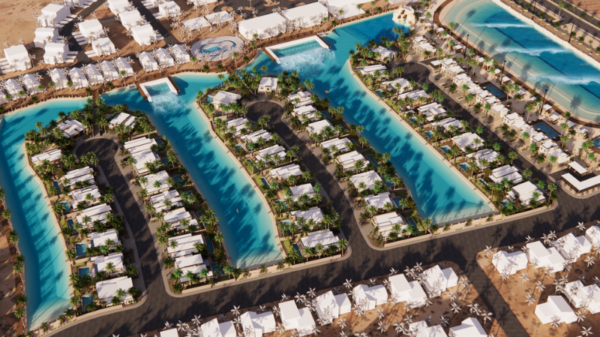

You must be logged in to post a comment Login